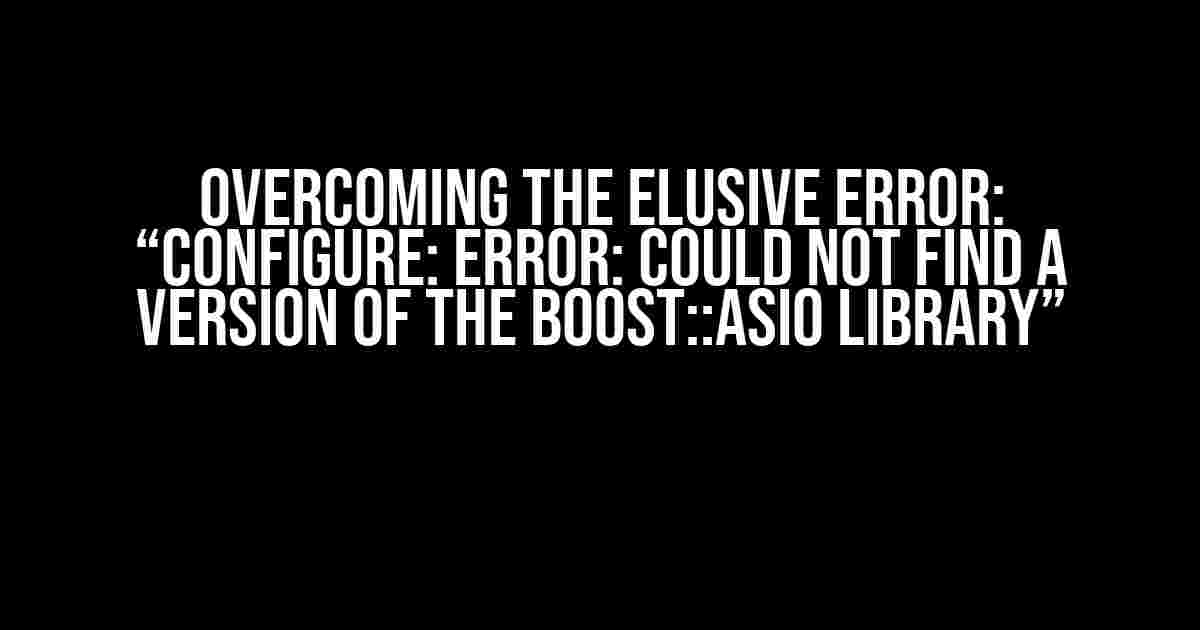If you’ve stumbled upon this error while trying to install a package or build a project, don’t worry – you’re not alone! Many developers have encountered this frustrating hurdle. In this comprehensive guide, we’ll delve into the world of Boost::Asio, explore the reasons behind this error, and provide you with clear, step-by-step instructions to overcome it.
What is Boost::Asio?
Before we dive into the solution, let’s take a brief look at what Boost::Asio is and why it’s crucial for your project. Boost::Asio is a cross-platform C++ library that provides a low-level, asynchronous I/O module for networking and low-level I/O operations. It’s a part of the Boost C++ Libraries, a popular collection of reusable, open-source libraries.
Why Do I Need Boost::Asio?
Boost::Asio is often required by packages and projects that rely on low-level networking and I/O operations. Some popular examples include:
- node.js
- Qt
- ZeroMQ
- CMake
If you’re working on a project that involves any of these, you might encounter the dreaded “configure: error” message. But fear not – we’re about to tackle it!
Reasons Behind the Error
Before we jump into the solution, let’s identify the common culprits behind this error:
- Missing Boost::Asio Installation: The most common reason is that Boost::Asio is not installed on your system or not properly configured.
- Outdated Boost::Asio Version: Having an outdated version of Boost::Asio can cause compatibility issues, leading to the error.
- Missing or Corrupted Boost::Asio Header Files: Damaged or missing header files can prevent the configure script from finding the required Boost::Asio components.
- Incorrect PATH or ENV Variables: Misconfigured system paths or environment variables can prevent the configure script from locating Boost::Asio.
Step-by-Step Solution
Now that we’ve identified the probable causes, let’s walk through the step-by-step solution to overcome the “configure: error” hurdle:
1. Install Boost::Asio
If you haven’t already, install Boost::Asio on your system. The installation process varies depending on your operating system:
| Operating System | Installation Command |
| Ubuntu/Debian | sudo apt-get install libboost-dev libboost-all-dev |
| CentOS/RHEL/Fedora | sudo yum install boost-devel |
| macOS (with Homebrew) | brew install boost |
| Windows (with vcpkg) | vcpkg install boost |
2. Verify Boost::Asio Installation
After installation, verify that Boost::Asio is properly installed by checking the version:
$ boost-config --version
This command should output the version of Boost::Asio installed on your system.
3. Update Boost::Asio (If Necessary)
If you’re running an outdated version, update Boost::Asio to the latest version:
$ sudo apt-get update $ sudo apt-get install libboost-dev libboost-all-dev
For other operating systems, refer to the official documentation for updating Boost::Asio.
4. Check for Missing or Corrupted Header Files
Ensure that the Boost::Asio header files are present and not corrupted:
$ find /usr/include -name "boost_asio.hpp"
This command should output the path to the `boost_asio.hpp` header file. If the file is missing or corrupted, reinstall Boost::Asio.
5. Configure PATH and ENV Variables
Verify that your system’s PATH and environment variables are correctly set:
$ echo $PATH $ echo $LD_LIBRARY_PATH $ echo $C_INCLUDE_PATH
Make sure the paths include the Boost::Asio installation directory. If not, update the environment variables accordingly:
$ export PATH=$PATH:/usr/local/include/boost $ export LD_LIBRARY_PATH=$LD_LIBRARY_PATH:/usr/local/lib $ export C_INCLUDE_PATH=$C_INCLUDE_PATH:/usr/local/include
Replace `/usr/local` with the actual installation path of Boost::Asio on your system.
Conclusion
By following these steps, you should be able to overcome the “configure: error: Could not find a version of the Boost::Asio library” hurdle. Remember to:
- Install Boost::Asio if it’s not already installed.
- Verify the installation and update Boost::Asio if necessary.
- Check for missing or corrupted header files.
- Configure PATH and environment variables correctly.
With these instructions, you’ll be well on your way to resolving this frustrating error and getting your project back on track. Happy coding!
Bonus Tip: Debugging the Configure Script
If you’re still encountering issues, try debugging the configure script to identify the exact problem:
$ ./configure --debug
This will output verbose information about the configure process, helping you pinpoint the issue.
Frequently Asked Question
Stuck with the “configure: error: Could not find a version of the Boost::Asio library” error? Worry not, friend! We’ve got you covered with these FAQs :
Why am I getting this error in the first place?
The error occurs when the configure script is unable to find a compatible version of the Boost::Asio library on your system. This library is required for building certain software, and the configure script is trying to figure out if your system meets the necessary dependencies.
How do I check if I have the Boost::Asio library installed?
You can check if you have the Boost::Asio library installed by running the command dpkg -l | grep libboost-asio (for Ubuntu-based systems) or yum list | grep boost-asio (for RPM-based systems). If you don’t see the library listed, you’ll need to install it.
How do I install the Boost::Asio library?
You can install the Boost::Asio library using your system’s package manager. For Ubuntu-based systems, run sudo apt-get install libboost-asio-dev; for RPM-based systems, run sudo yum install boost-asio-devel; and for macOS (with Homebrew), run brew install boost.
What if I have the library installed, but the error persists?
In this case, try setting the BOOST_ASIO_INCLUDE and BOOST_ASIO_LIBRARY environment variables to point to the correct locations of the Boost::Asio headers and library files, respectively. You can do this using the -I and -L flags with the configure script.
Is there a way to workaround this error without installing the Boost::Asio library?
In some cases, you might be able to disable the requirement for the Boost::Asio library by passing a configure option, such as --without-boost-asio or --disable-boost-asio. However, this might limit the functionality of the software you’re trying to build.

